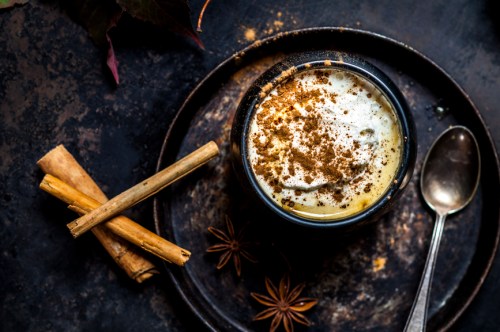When it comes to drinking habits for better sleep, it’s just as important to know what’s ideal to sip on for a pre-ZZZ treat as it is to limit intake of certain bevs—think coffee and alcohol—too late in the day. One bedtime beverage that’s (ahem) gaining steam in the wellness world is moon milk, which has the potential to calm your mind and body and support high-quality shuteye.
Experts in This Article
If you’re new to moon milk and its benefits, or are curious to explore its Ayurvedic roots, you’re in the right place. We reached out to Laura Croyt, a clinical Ayurvedic practitioner at Den Mother in Venice, California, to get the scoop on everything worth knowing about this sleep-friendly tonic.
What is moon milk?
“Moon milk is an elixir that combines warm milk with spices and/or herbs to provide a warming and calming effect on the mind,” Croyt says. She notes that it’s an easier, modernized version of ksheerapaka, “the classical Ayurvedic preparation where milk and water are decocted with medicinal herbs.”
In both cases, Croyt explains, “Milk is used as a fat- and water-soluble vehicle to extract the medicinal properties of herbs and to reduce their sharp intensity when needed.” The process also permits the body to readily accept the herbs and spices, thus enhancing their beneficial effects.
How moon milk can promote better sleep
If you struggle with insomnia, restlessness, or mental overactivity, Croyt says that your Vata dosha (dosha meaning your innate constitution or energy pattern) is likely heightened. “The Vata dosha is the energy of the wind, hence the racing thoughts that act like wind and carry the mind away from rest,” she says. Vata qualities are dry, light, cold, and fast—and moon milk can bring these qualities back into balance.
“Warm milk is both heavy and moist, two qualities that ground the Vata dosha,” says Croyt. From there, you can customize moon milk to calm restless Vata energy even further with the right spices and herbs. “Vata-pacifying aromatic spices that have an affinity for sleep and stress [include] cardamom, mace, saffron, and turmeric,” as well as Croyt’s personal favorite: nutmeg.
“Nutmeg is a heating spice with sedative properties. It helps to improve sleep quality by reducing stress and tension,” Croyt shares. “In Ayurveda, it’s used in the cooler months, so it’s the perfect spice to help you feel less frazzled and on edge during winter.”
Certain herbal remedies can also help to facilitate a good night’s rest. “Specific herbs for improving sleep and soothing the nervous system are Brahmi, Shatavari, rose petals, chamomile, and lavender,” Croyt says. She also calls out ashwagandha in particular, an adaptogen prized in ancient Ayurvedic tradition for its calming and rejuvenating properties. A 2019 double-blind, randomized, placebo-controlled study concluded that ashwagandha can improve sleep quality and sleep onset latency, even in those with insomnia and anxiety—so it’s well worth including it in your moon milk recipe (as tolerated).
“Whether you’re struggling with sleeplessness or the occasional bout of stress that has derailed your sleep routine, this herbal nightcap has the power to help you slow down, ground your mind and body, and ease into sleep,” Croyt summarizes.
Tips to make your own moon milk recipe
Croyt reiterates that moon milk is highly customizable based on your taste preferences and the spices and herbs you have on hand. It’s also more flexible than traditional ksheerapaka recipes, as the latter requires more time and precise measurements.
With that in mind, here are a few helpful FYIs before you whip up her own moon milk recipe—or get creative by concocting your very own:
- According to Croyt, the milk you choose can make or break your recipe. She recommends opting for whole A2 organic grass-fed cow’s milk, noting that it’s healthier and easier to digest than conventional varieties.
- If you have a hard time digesting dairy or follow a plant-based diet, alt milks are also fair game. “You can use your favorite plant-based milk—such as coconut, almond, oat, or hemp—and still see great results,” Croyt explains.
- While you *can* use a milk frother or a steamer, Croyt strongly advises going for the stovetop route instead. “It’s important to bring your moon milk to a boil and let it simmer to help extract the water- and fat-soluble properties of the spices and herbs,” she says.
- While Croyt favors nutmeg for her own moon milk, remember that personalization is encouraged. “Feel free to swap out nutmeg for another spice or herb,” she shares. “Great options include saffron, turmeric, chamomile, rose petals, and ashwagandha.”
- Finally, Croyt offers special instructions if you decide to use ashwagandha in your DIY moon milk recipe: “Use one teaspoon of ashwagandha powder to one cup of water and one cup milk. You’ll need to boil the mixture and reduce it by half.” She also suggests adding cardamom, cinnamon, and other gut-friendly spices, as ashwagandha can be difficult to digest for some.
An Ayurvedic expert’s nutmeg moon milk recipe for restful sleep
Ingredients1 cup milk1⁄2 teaspoon freshly grated nutmegPinch of cinnamon or cardamom powder1⁄4 teaspoon ghee or coconut oil, optionalHoney or another sweetener to taste, optional
Instructions1. Bring all ingredients to a boil in a small saucepan and simmer on medium-low for three to five minutes, stirring occasionally.
2. Pour into a mug and add sweetener to taste. If using honey, be sure to let your moon milk cool down a bit before adding it in.
3. Sip and enjoy, free of distractions, and with gratitude and peace.
Note: As beneficial as moon milk can be, Croyt mentions that it may not be ideal for everyone. “Ayurvedically speaking, moon milk is not recommended for those with an active cold, cough, or severe [digestive imbalances] as it can lead to indigestion,” Croyt says. Also, before adding any new herbs to your routine, it’s best to consult a healthcare professional to ensure that they’re safe and suitable for you.
Sign Up for Our Daily Newsletter
Get all the latest in wellness, trends, food, fitness, beauty, and more delivered right to your inbox.
Got it, you've been added to our email list.










